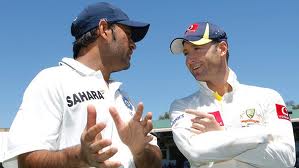
It's crunch time for MS Dhoni. Another series loss will almost surely result in the Indian captain losing the hot seat. For the prolific Michael Clarke, the challenge will be to get the best out of a less-than-formidable Australian side, arguably the weakest to tour India since Kim Hughes' men in 1979-80. Which skipper will have the last laugh?
As individuals, they are as different as chalk and cheese. When Mahendra Singh Dhoni and Michael Clarke go out for the toss at the MA Chidambaram Stadium in Chennai three days from now, the Indian captain and his Australian counterpart would be guided by different dynamics in their pursuit of a common goal -- winning the four-Test series that gets underway on Friday. No prizes for guessing who will be under more pressure.
For Dhoni, it would be all about reversing a disturbing trend that has seen Team India losing 10 of their last 17 Test matches. A 1-2 series loss at home to Alastair Cook's England late last year, coming close on the heels of successive 4-0 whitewashes in England and Australia, should have ended Dhoni's reign at the top of the pecking order, at least in the game's most testing format.
The selectors' decision to persist with Dhoni stems from a sheer lack of options for Indian cricket's hot seat and in no way does it reflect a vote of confidence in the man who appears to have lost appetite for Test cricket. With a majority of senior players struggling to hold on to their own spots in the side, Dhoni has been plain lucky to keep his job in the upcoming series against Australia.
And no one knows it better than the skipper himself that another debacle at home will almost certainly result in loss of captaincy and put a question mark over his future in Test cricket.
The Test series against Australia represents the moment of truth for Dhoni, who must rediscover his zeal for the five-day format in which his approach and leadership skills have been called into question in recent times. It will be tough for Dhoni, who must not only raise his own game a few notches, but also the morale of his side that continues to flatter to deceive.
The biggest challenge before Dhoni is to use his rather limited bowling resources efficiently in order to put the Aussies under pressure. He will also be hoping that India's batting unit, which failed collectively and repeatedly against England, will come into its own and put enough runs on the board and give the bowlers enough time to dismiss the opposition twice.
Clarke, on the other hand, faces a different set of challenges. Having come to India with a squad that, at least on paper, looks the weakest after Kim Hughes' novices of 1979-80, Clarke must lead by example in order to fuel Australia's winning ambitions on this tour.
He has a robust pace attack at his disposal, but wafer-thin spin options and a largely inexperienced middle-order could give the skipper a nightmare in conditions alien to the Aussies.
Clarke himself has not put a foot wrong since taking over the mantle of captaincy from Ricky Ponting in 2011. His rich vein of form with the bat has ensured that Australia have won 12 of the 21 Tests under his leadership. Now, without the towering presence of Ponting in the dressing room, Clarke has a chance to be his own man and build a strong Australian side for the future.
To do that, it is imperative that Clarke and Co. make a strong statement of intent in the series even as Dhoni and his boys look to resurrect India's floundering reputation in the Test arena.





Comments
Add new comment